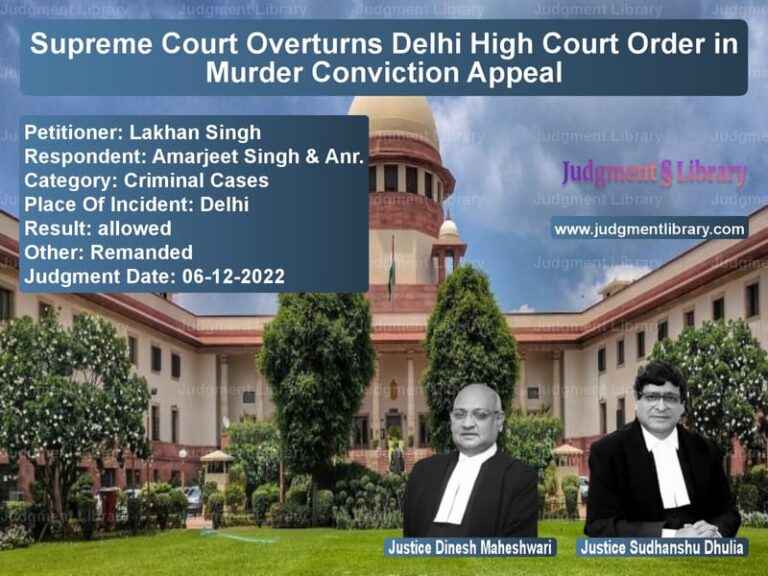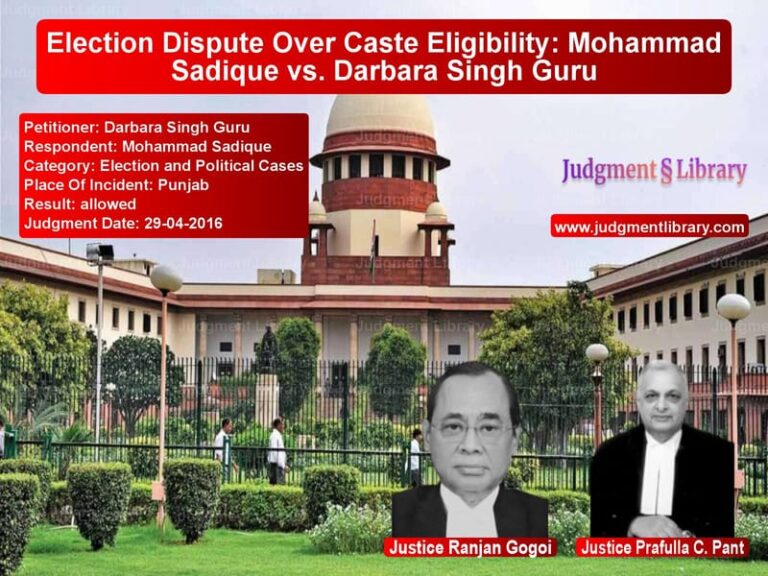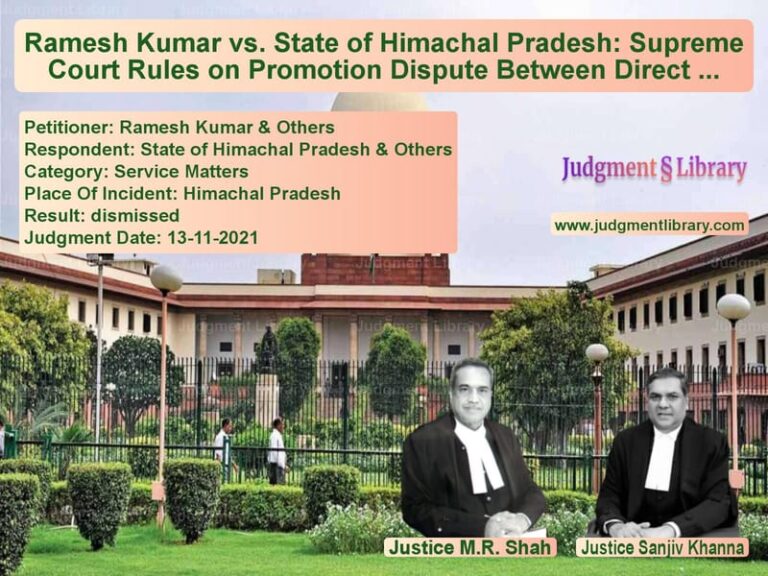Prevention of Corruption Act and Sanction Requirement: Supreme Court Ruling on Public Servant Protection
The case of L. Narayana Swamy v. State of Karnataka & Ors. revolves around the prosecution of public servants under the Prevention of Corruption Act, 1988 (P.C. Act) and the necessity of obtaining prior sanction before initiating criminal proceedings. This judgment by the Supreme Court clarifies the legal position on sanction requirements when a public servant has been transferred or promoted to another position.
Background of the Case
A complaint was filed by the second respondent, alleging that the accused, including government officials (accused Nos. 3 and 5), had committed offenses under Sections 13(1)(d) read with 13(2) of the Prevention of Corruption Act and Sections 120B, 427, 447, and 506 read with Section 34 of the Indian Penal Code (IPC). The allegations pertained to illegal land transactions involving senior politicians and bureaucrats.
The complaint claimed that the accused had manipulated land records and facilitated fraudulent transactions in collusion with influential persons. The District and Sessions Judge, Bellari, directed an investigation under Section 156(3) of the Code of Criminal Procedure (Cr.P.C.), leading to the registration of the case as Crime No. 9/2013.
Petitioner’s Arguments
- The accused officials contended that there were no direct allegations against them justifying the initiation of criminal proceedings.
- They argued that before ordering an investigation under Section 156(3) of Cr.P.C., the trial court should have ensured that prior sanction was obtained under Section 19(1) of the P.C. Act.
- The officials, though transferred to different posts, remained public servants and, therefore, were entitled to protection under the law.
- The order for further investigation was based on an erroneous representation that a final report had been filed when, in reality, the investigation was incomplete.
Respondent’s Arguments
- The prosecution argued that the accused had abused their official position to facilitate fraudulent land transactions.
- It was contended that sanction under Section 19 of the P.C. Act was not required before an investigation was ordered, as the trial court had not yet taken cognizance of the case.
- The accused had acted in collusion with high-ranking officials and politicians, which warranted a thorough investigation.
Supreme Court’s Judgment
The Supreme Court addressed two key legal questions:
1. Can an investigation under Section 156(3) of Cr.P.C. be ordered without prior sanction?
The Court held that an order directing an investigation under Section 156(3) of Cr.P.C. cannot be passed in the absence of valid sanction. The Court relied on its previous rulings in Anil Kumar & Ors. v. M.K. Aiyappa and Manharibhai Muljibhai Kakadia v. Shaileshbhai Mohanbhai Patel, stating that:
“The mandatory character of the protection afforded to a public servant is brought out by the expression, ‘no court shall take cognizance of such an offence except with the previous sanction.’”
The Court emphasized that sanction is a prerequisite even at the pre-cognizance stage and that magistrates must ensure compliance with Section 19 of the P.C. Act before ordering investigations.
2. Does a public servant lose protection under Section 19(1) of the P.C. Act upon transfer or promotion?
The Court ruled that if a public servant has been transferred or promoted to a different position, sanction under Section 19(1) of the P.C. Act is not required at the time of cognizance. The Court referred to Abhay Singh Chautala v. CBI and Prakash Singh Badal v. State of Punjab, holding that:
“If the public servant had abused entirely different office than the one which he was holding on the date on which cognizance was taken, there was no necessity of sanction under Section 19 of the P.C. Act.”
The Court clarified that when an official is accused of misconduct during a previous tenure but has since been assigned a different role, no sanction is necessary at the time of cognizance.
Conclusion
- Sanction under Section 19 of the P.C. Act is mandatory before initiating an investigation under Section 156(3) of Cr.P.C.
- Once a public servant is transferred or promoted to a different position, sanction is not required at the time of cognizance.
- The Court dismissed the appeal but acknowledged that the High Court erred in ruling that sanction was not necessary before investigation.
This judgment reinforces the procedural safeguards in corruption cases while ensuring that guilty officials cannot evade prosecution by changing positions within the government.
Don’t miss out on the full details! Download the complete judgment in PDF format below and gain valuable insights instantly!
Download Judgment: L. Narayana Swamy vs State of Karnataka & Supreme Court of India Judgment Dated 06-09-2016-1741883699078.pdf
Direct Downlaod Judgment: Direct downlaod this Judgment
See all petitions in Money Laundering Cases
See all petitions in Fraud and Forgery
See all petitions in Extortion and Blackmail
See all petitions in Judgment by A.K. Sikri
See all petitions in Judgment by N.V. Ramana
See all petitions in dismissed
See all petitions in supreme court of India judgments September 2016
See all petitions in 2016 judgments
See all posts in Criminal Cases Category
See all allowed petitions in Criminal Cases Category
See all Dismissed petitions in Criminal Cases Category
See all partially allowed petitions in Criminal Cases Category







